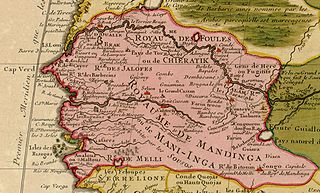
The history of Senegal is commonly divided into a number of periods, encompassing the prehistoric era, the precolonial period, colonialism, and the contemporary era.

Groupe Union Défense, better known as GUD, is a French far-right students' union formed in the 1960s. After a period of inactivity it relaunched in 2022.

Mopti is a town and an urban commune in the Inner Niger Delta region of Mali. The town is the capital of the Mopti Cercle and the Mopti Region. Situated 630 km northeast of Bamako, the town lies at the confluence of the Niger and the Bani Rivers and is linked by an elevated causeway to the town of Sévaré. The urban commune, which includes both Mopti and Sévaré, had a population of 114,296 in the 2009 census.

Kati is an urban commune and the largest town in Mali's Koulikoro Region. The town is situated 15 km northwest of Bamako, Mali's capital, on the Dakar-Niger Railway. In the 2009 census, the commune had a population of 114,983.
Moussa Konaté was a Malian writer who was born in Kita. He died in Limoges on 30 November 2013.

Mamadou Dia was a Senegalese politician who served as the first Prime Minister of Senegal from 1957 until 1962, when he was forced to resign and was subsequently imprisoned amidst allegations that he was planning to stage a military coup to overthrow President Léopold Sédar Senghor.
Abdelkebir Khatibi was a prolific Moroccan literary critic, novelist, philosopher, playwright, poet, and sociologist. Affected in his late twenties by the rebellious spirit of 1960s counterculture, he challenged in his writings the social and political norms upon which the countries of the Maghreb region were constructed. His collection of essays Maghreb pluriel is one of his most notable works.

Jad Hatem is a Lebanese poet and philosopher. He has been a distinguished philosophy, literature and religious sciences Professor at the Saint-Joseph University in Beirut since 1976. Hatem has been the Head of Department of Philosophy and the Director of Michel Henry's Study Center within that department. He's also Editor in Chief of Extasis (1980–1993), La Splendeur du Carmel and L'Orient des dieux, and serves on various other academic editorial boards.
Fily Dabo Sissoko was a Malian writer and political leader, born 15 May 1900 at Horokoto. He died 30 June 1964, imprisoned at Kidal. Fily Dabo Sissoko is chiefly remembered as one of the most influential political leaders of pre-independence Mali, primary conservative rival to Mali's first President Modibo Keita, and an influential writer of the Negritude movement.
Roger de Lafforest,, was a French writer. Lafforest has titles published and re-editions since 1927 in Czech, English, French, Portuguese, Slovak, Polish, and Spanish. He was bestowed with the Prix Interallié, a French award of literature in 1939.

The legend of Mali Sadio takes place around the city of Bafoulabé,Mali. It is presented as a factual story transmitted by oral tradition, although it has had several changes applied to it over time. There are currently several versions of the legend.
Pius Ngandu Nkashama was a professor, writer, playwright, poet and literary critic. He was born September 4, 1946 in Mbujimayi in the province of Kasai Oriental in the Democratic Republic of the Congo. He died on December 19, 2023 in Baton-Rouge, Louisiana, US.
Marie-Cessette Dumas was a female slave in the French colony of Saint Domingue. She was the mother of General Thomas-Alexandre Dumas, the grandmother of novelist Alexandre Dumas, and the great-grandmother of playwright Alexandre Dumas, fils, and has been called a "great matriarch to a saga of distinguished men". She was a slave of African descent enslaved by the Marquis Alexandre Antoine Davy de La Pailleterie. They lived at a plantation called La Guinaudée near Jérémie of the French colony of Saint-Domingue, until Antoine's departure in 1775.

Surinamese Maroons are the descendants of enslaved Africans that escaped from the plantations and settled in the inland of Suriname. The Surinamese Maroon culture is one of the best-preserved pieces of cultural heritage outside of Africa. Colonial warfare, land grabs, natural disasters and migration have marked Maroon history. In Suriname six Maroon groups — or tribes — can be distinguished from each other.
Ghislaine Nelly Huguette Sathoud is a Congolese feminist, primarily concerned with domestic violence.
Rabah Belamri was an Algerian writer.
Christian Le Guillochet was a French actor, playwright and theatre director.
Oumou Armand Diarra is the pseudonym of Malian writer Oumou Modibo Sangare. She is the author of several articles about the struggle of women in Africa and Mali. She advocates social development while being consistent with the positive rules of the traditional and modern society of her country.
Moussoumakan "Inna" Sissoko Cissé,, is a Malian politician, nurse, and social worker who served as Secretary of State for Social Affairs from 1968 to 1972. She was the first woman to be a member of Mali's government.







